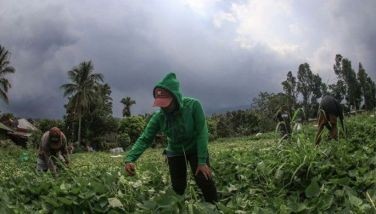Zamboanga tribe hits jackpot as mining returns to RP
November 2, 2005 | 12:00am
CANATUAN, Zamboanga del Sur (AFP) — Life has never been the same for the tribe of impoverished slash and burn farmers in this southern Philippines mountain since strange men arrived a few years ago in search of "red rock."
For months the villagers watched in awe as giant iron caterpillars ate the earth around them while men wearing hard hats altered the course of streams.
In time the diggers had ripped open the mountaintop, unlocking the red-tinged ore containing gold and silver ... the very fuel that could breathe new life back into the economy of this poor Southeast Asian nation.
While the project has sparked inevitable controversy in this conflict scarred corner of the archipelago, today the mine is cited as an example of how resource companies and indigenous communities can coexist.
Subanen villagers believe they have hit the jackpot.
Danilo Basun, a member of the council of elders of the Subanen cultural minority group that owns the ancestral domain title to the area, says the mine has been a great benefit to the local community since it began commercial production last year.
"During the time of the small-scale miners we did not have any jobs. The arrival of the big-scale mine gave us jobs and a road to Siocon (town, 27 kilometers away). Before we used to hike to Siocon and we had to ford several rivers. It took us four hours," he says.
The elders manage a trust fund from royalties paid monthly by the mine operator, Canada’s TVI Pacific Inc., equivalent to one percent of mine revenues.
With an insatiable global demand for electronics products buoying precious metals prices, the 1,112 residents of the area stand to earn about one million dollars over the lifespan of the mine — based on spot prices and reserve estimates provided by Calgary-based TVI.
Mining has transformed the village that sits about 429 meters above sea level on the mountainous Zamboanga peninsula of Mindanao island.
Gravel roads and steel bridges have drastically cut travel time to Siocon and Roseller Lim towns.
The mill’s power plant lights up the hamlet, which now boasts a health clinic, day care, and a bigger elementary school.
"One of my children is now in college," says Basun.
With an annual budget of more than P300 million, the company became Siocon’s top taxpayer and employer. TVI primes the regional economy with purchases of various supplies and services from across Mindanao.
The government is cashing in by taxing output, income, and use of the land.
The modest, 508-hectare Canatuan mine, now processing 750 tons of ore per day, was the first foreign-funded project to reach production stage since the Philippines passed a new mining law in 1995.
President Arroyo hopes it would be only the first of many mining investments that she says would bring jobs and development to desperately poor communities in the Philippines.
More than half the mine’s 650 workers are Subanens. Many of them act as security guards trained by the Philippine military.
Jay Nelson, 52, an American environmental protection manager, holds one of the key jobs of the TVI mine.
He built a reinforced concrete tailings dam and then altered the course of the Canatuan creek, building a catchment basin upstream to prevent ground water seepage and contamination of the Siocon river downstream.
"I’m not God, I’m just an engineer," he said. "We’re just here to give Mother Nature a good start."
An unlikely coalition of Roman Catholic bishops, local executives, and leftist agitators wants the mine shut down on environmental grounds.
But Nelson said mercury poisoning from the unlicensed small scale miners that arrived in Canatuan in the late 1980s was to blame for the degradation of Siocon and other rivers in Mindanao that intersect other gold-rush areas.
Employing a method of extracting gold that the mainstream mining companies abandoned nearly a century ago, small-scale miners and gold panners use between two and three tonnes of mercury to process a tonne of gold ore, he said.
TVI uses a kilo of cyanide to leach gold and silver from a tonne of crushed ore.
Twelve tonnes of rock — one truckload — produces 36 grams of gold — about a teaspoonful — and 1.2 kilos of silver.
TVI says the cyanide dissipates when exposed to sunlight. Water from the tailings dam is also recycled to grind the ore.
Civilizations cannot exist without farming and mining, said TVI Pacific’s 59-year-old country manager John Ridsdel.
"Mining impacts the environment. The issue is how do we manage that," said the Canadian who previously worked in the oil industry.
A generation after being cut down by plunging metals prices and a high-profile copper mine tailings dam leak that silted a central Philippines river, the resources sector now operates under stricter regulatory framework.
Nelson said TVI bought the tailings of the unlicensed small-scale miners and milled enough gold from the reprocessed mine waste to sustain its operations for a year in 2003.
The company planted 18,000 trees last year to cover up denuded areas of the mountain and is to plant 40,000 more this year. After the mining ends, Philippine law also requires TVI to clean up and restore the tree cover of the area.
"One of the big issues in the Philippines is that it takes forever" to get anything done, Ridsdel said, citing the near-absolute authority of local officials to withhold a mining permit.
"In Canada, to obtain a mineral title you go on to a website, you give your credit card number, file it and you have the title in seconds."
After the 1970s metals prices crash, Filipino license-holders sat on their concessions for years, unable to raise the huge amounts of capital needed for exploration.
TVI bought the Canatuan license and sank about $60 million in the Philippines since 1994.
Ridsdel says President Arroyo has "really made tremendous strides" in reviving the mining industry.
After the Canatuan gold and silver ores are exhausted, TVI would mine copper, zinc, as well as gold and silver from the seam underneath. Meanwhile, Ridsdel said part of company profits would be plowed into exploring an extra 37,000 hectares of mine prospects around Canatuan.
Environmental concerns are not the only challenge facing TVI, with killings and outlaw gangs also stirring controversy.
Fifteen Subanen TVI workers and relatives were killed in ambushes in 2002 that community elders suspect were linked to a quarrel for control of the royalties.
Muslim separatists, militants, bandits and kidnap gangs have operated for decades in the region so the bullion output is shipped out in secret.
It eventually ends up in Hong Kong, where the silver and gold is separated further for use to build computers and other products.
As the modern world requires more and more oil and metals, miners have to venture into "areas that are not governed in the same way that advanced cities would be governed," Ridsdel said.
"We’ve had various kinds of attempts to collect illegal money from TVI," he adds. "We believe that a large portion of our political controversy is precisely because we have not played that game."
Arroyo bows out of office in 2010, but Ridsdel said he would bet serious money that the mining industry would have produced sufficient success stories by then "that the new government will not change the policies."
The Subanens realize that the goose that lays the golden egg would eventually leave, and are investing in their future.
Local lawyer Pablo Bernardo, adviser to Subanen elders, said most have limited marketable skills and that the royalty trust’s focus is college scholarships for select Subanen children.
"When the mine closes down, we will have left a legacy to our children, having sent them to school," said Alfredo Limbang, treasurer of the council of elders.
They are also planting rubber trees on communal farms and hope to cultivate other cash crops, such as coffee.
For months the villagers watched in awe as giant iron caterpillars ate the earth around them while men wearing hard hats altered the course of streams.
In time the diggers had ripped open the mountaintop, unlocking the red-tinged ore containing gold and silver ... the very fuel that could breathe new life back into the economy of this poor Southeast Asian nation.
While the project has sparked inevitable controversy in this conflict scarred corner of the archipelago, today the mine is cited as an example of how resource companies and indigenous communities can coexist.
Subanen villagers believe they have hit the jackpot.
Danilo Basun, a member of the council of elders of the Subanen cultural minority group that owns the ancestral domain title to the area, says the mine has been a great benefit to the local community since it began commercial production last year.
"During the time of the small-scale miners we did not have any jobs. The arrival of the big-scale mine gave us jobs and a road to Siocon (town, 27 kilometers away). Before we used to hike to Siocon and we had to ford several rivers. It took us four hours," he says.
The elders manage a trust fund from royalties paid monthly by the mine operator, Canada’s TVI Pacific Inc., equivalent to one percent of mine revenues.
With an insatiable global demand for electronics products buoying precious metals prices, the 1,112 residents of the area stand to earn about one million dollars over the lifespan of the mine — based on spot prices and reserve estimates provided by Calgary-based TVI.
Mining has transformed the village that sits about 429 meters above sea level on the mountainous Zamboanga peninsula of Mindanao island.
Gravel roads and steel bridges have drastically cut travel time to Siocon and Roseller Lim towns.
The mill’s power plant lights up the hamlet, which now boasts a health clinic, day care, and a bigger elementary school.
"One of my children is now in college," says Basun.
The government is cashing in by taxing output, income, and use of the land.
The modest, 508-hectare Canatuan mine, now processing 750 tons of ore per day, was the first foreign-funded project to reach production stage since the Philippines passed a new mining law in 1995.
President Arroyo hopes it would be only the first of many mining investments that she says would bring jobs and development to desperately poor communities in the Philippines.
More than half the mine’s 650 workers are Subanens. Many of them act as security guards trained by the Philippine military.
Jay Nelson, 52, an American environmental protection manager, holds one of the key jobs of the TVI mine.
He built a reinforced concrete tailings dam and then altered the course of the Canatuan creek, building a catchment basin upstream to prevent ground water seepage and contamination of the Siocon river downstream.
"I’m not God, I’m just an engineer," he said. "We’re just here to give Mother Nature a good start."
An unlikely coalition of Roman Catholic bishops, local executives, and leftist agitators wants the mine shut down on environmental grounds.
But Nelson said mercury poisoning from the unlicensed small scale miners that arrived in Canatuan in the late 1980s was to blame for the degradation of Siocon and other rivers in Mindanao that intersect other gold-rush areas.
Employing a method of extracting gold that the mainstream mining companies abandoned nearly a century ago, small-scale miners and gold panners use between two and three tonnes of mercury to process a tonne of gold ore, he said.
TVI uses a kilo of cyanide to leach gold and silver from a tonne of crushed ore.
Twelve tonnes of rock — one truckload — produces 36 grams of gold — about a teaspoonful — and 1.2 kilos of silver.
TVI says the cyanide dissipates when exposed to sunlight. Water from the tailings dam is also recycled to grind the ore.
Civilizations cannot exist without farming and mining, said TVI Pacific’s 59-year-old country manager John Ridsdel.
"Mining impacts the environment. The issue is how do we manage that," said the Canadian who previously worked in the oil industry.
A generation after being cut down by plunging metals prices and a high-profile copper mine tailings dam leak that silted a central Philippines river, the resources sector now operates under stricter regulatory framework.
Nelson said TVI bought the tailings of the unlicensed small-scale miners and milled enough gold from the reprocessed mine waste to sustain its operations for a year in 2003.
The company planted 18,000 trees last year to cover up denuded areas of the mountain and is to plant 40,000 more this year. After the mining ends, Philippine law also requires TVI to clean up and restore the tree cover of the area.
"One of the big issues in the Philippines is that it takes forever" to get anything done, Ridsdel said, citing the near-absolute authority of local officials to withhold a mining permit.
"In Canada, to obtain a mineral title you go on to a website, you give your credit card number, file it and you have the title in seconds."
After the 1970s metals prices crash, Filipino license-holders sat on their concessions for years, unable to raise the huge amounts of capital needed for exploration.
TVI bought the Canatuan license and sank about $60 million in the Philippines since 1994.
Ridsdel says President Arroyo has "really made tremendous strides" in reviving the mining industry.
After the Canatuan gold and silver ores are exhausted, TVI would mine copper, zinc, as well as gold and silver from the seam underneath. Meanwhile, Ridsdel said part of company profits would be plowed into exploring an extra 37,000 hectares of mine prospects around Canatuan.
Fifteen Subanen TVI workers and relatives were killed in ambushes in 2002 that community elders suspect were linked to a quarrel for control of the royalties.
Muslim separatists, militants, bandits and kidnap gangs have operated for decades in the region so the bullion output is shipped out in secret.
It eventually ends up in Hong Kong, where the silver and gold is separated further for use to build computers and other products.
As the modern world requires more and more oil and metals, miners have to venture into "areas that are not governed in the same way that advanced cities would be governed," Ridsdel said.
"We’ve had various kinds of attempts to collect illegal money from TVI," he adds. "We believe that a large portion of our political controversy is precisely because we have not played that game."
Arroyo bows out of office in 2010, but Ridsdel said he would bet serious money that the mining industry would have produced sufficient success stories by then "that the new government will not change the policies."
The Subanens realize that the goose that lays the golden egg would eventually leave, and are investing in their future.
Local lawyer Pablo Bernardo, adviser to Subanen elders, said most have limited marketable skills and that the royalty trust’s focus is college scholarships for select Subanen children.
"When the mine closes down, we will have left a legacy to our children, having sent them to school," said Alfredo Limbang, treasurer of the council of elders.
They are also planting rubber trees on communal farms and hope to cultivate other cash crops, such as coffee.
BrandSpace Articles
<
>
- Latest
- Trending
Trending
Latest
Trending
Latest
Recommended































